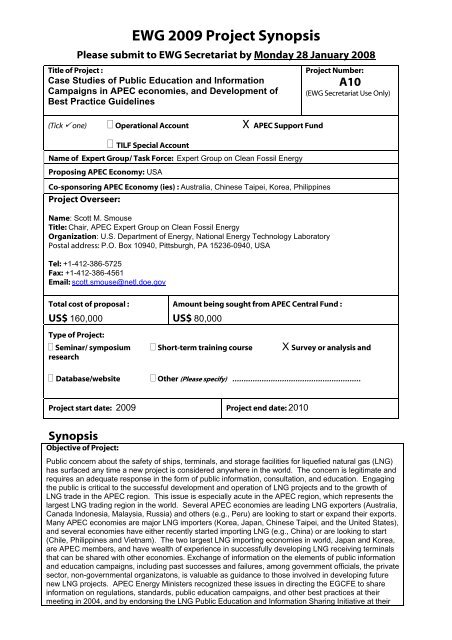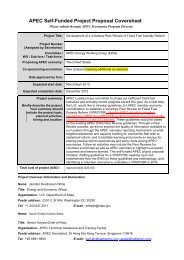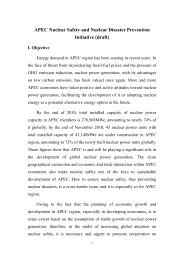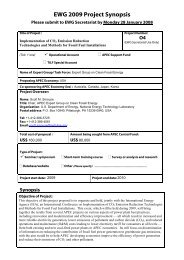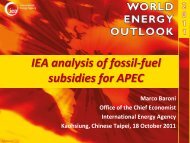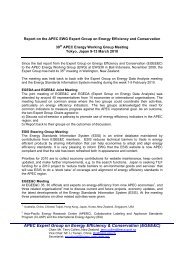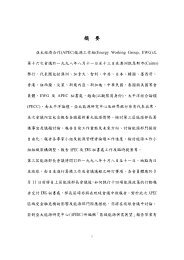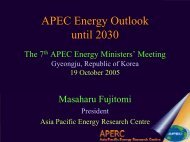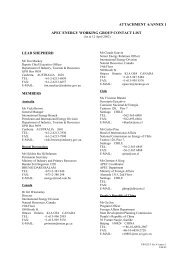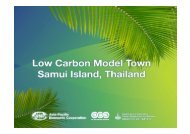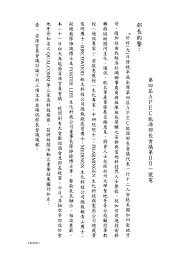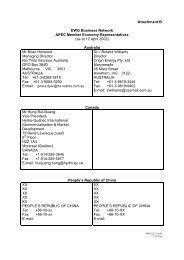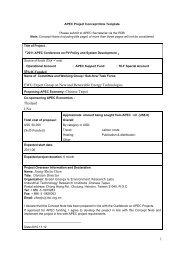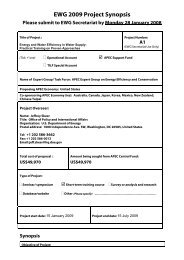EWG 2009 Project Synopsis
EWG 2009 Project Synopsis
EWG 2009 Project Synopsis
Create successful ePaper yourself
Turn your PDF publications into a flip-book with our unique Google optimized e-Paper software.
<strong>EWG</strong> <strong>2009</strong> <strong>Project</strong> <strong>Synopsis</strong><br />
Please submit to <strong>EWG</strong> Secretariat by Monday 28 January 2008<br />
Title of <strong>Project</strong> :<br />
Case Studies of Public Education and Information<br />
Campaigns in APEC economies, and Development of<br />
Best Practice Guidelines<br />
<strong>Project</strong> Number:<br />
A10<br />
(<strong>EWG</strong> Secretariat Use Only)<br />
(Tick one) Operational Account X APEC Support Fund<br />
TILF Special Account<br />
Name of Expert Group/ Task Force: Expert Group on Clean Fossil Energy<br />
Proposing APEC Economy: USA<br />
Co-sponsoring APEC Economy (ies) : Australia, Chinese Taipei, Korea, Philippines<br />
<strong>Project</strong> Overseer:<br />
Name: Scott M. Smouse<br />
Title: Chair, APEC Expert Group on Clean Fossil Energy<br />
Organization: U.S. Department of Energy, National Energy Technology Laboratory<br />
Postal address: P.O. Box 10940, Pittsburgh, PA 15236-0940, USA<br />
Tel: +1-412-386-5725<br />
Fax: +1-412-386-4561<br />
Email: scott.smouse@netl.doe.gov<br />
Total cost of proposal :<br />
US$ 160,000<br />
Amount being sought from APEC Central Fund :<br />
US$ 80,000<br />
Type of <strong>Project</strong>:<br />
Seminar/ symposium Short-term training course X Survey or analysis and<br />
research<br />
Database/website<br />
Other (Please specify) …………………………………………………<br />
<strong>Project</strong> start date: <strong>2009</strong> <strong>Project</strong> end date: 2010<br />
<strong>Synopsis</strong><br />
Objective of <strong>Project</strong>:<br />
Public concern about the safety of ships, terminals, and storage facilities for liquefied natural gas (LNG)<br />
has surfaced any time a new project is considered anywhere in the world. The concern is legitimate and<br />
requires an adequate response in the form of public information, consultation, and education. Engaging<br />
the public is critical to the successful development and operation of LNG projects and to the growth of<br />
LNG trade in the APEC region. This issue is especially acute in the APEC region, which represents the<br />
largest LNG trading region in the world. Several APEC economies are leading LNG exporters (Australia,<br />
Canada Indonesia, Malaysia, Russia) and others (e.g., Peru) are looking to start or expand their exports.<br />
Many APEC economies are major LNG importers (Korea, Japan, Chinese Taipei, and the United States),<br />
and several economies have either recently started importing LNG (e.g., China) or are looking to start<br />
(Chile, Philippines and Vietnam). The two largest LNG importing economies in world, Japan and Korea,<br />
are APEC members, and have wealth of experience in successfully developing LNG receiving terminals<br />
that can be shared with other economies. Exchange of information on the elements of public information<br />
and education campaigns, including past successes and failures, among government officials, the private<br />
sector, non-governmental organizatons, is valuable as guidance to those involved in developing future<br />
new LNG projects. APEC Energy Ministers recognized these issues in directing the EGCFE to share<br />
information on regulations, standards, public education campaigns, and other best practices at their<br />
meeting in 2004, and by endorsing the LNG Public Education and Information Sharing Initiative at their
2005 meeting.A very successful workshop on LNG public education was held in Guangzhou, P.R. China<br />
on November 5-7, 2007. The workshop, which was funded by an APEC TILF project, was aimed at<br />
capacity building and information exchange on this topic to facilitate moving to Best Practice Principles<br />
for Facilitating LNG Trade - which is a priority of APEC Energy Ministers as noted above. The workshop<br />
presentations are available on the workshop website. Responses to the workshop questionnaire were all<br />
highly favorable with both government and industry representatives stating that the workshop should be<br />
held annually rotating among LNG shipping and receiving economies in the region. Essentially all<br />
workshop participants found the event to be very effective, comprehensive, and informative, and<br />
particularly useful as a first step in building a communication network in the APEC region and sharing<br />
experiences and best practices related to LNG.<br />
The objectives of this project are to:<br />
• provide information on and examine in greater depth a number of case studies of LNG public<br />
education, consultation, and information campaigns held in APEC member economies;<br />
• develop best practice guidelines for such campaigns that will assist developing APEC economies<br />
in their communications with stakeholders and the public; and<br />
• build capacity in developing APEC economies in the area of LNG public information, education,<br />
and consultation.<br />
It is clear from the comments made both during the workshop and in the questionnaire responses that<br />
those involved in this area in member economies are demanding further follow-up. Such follow-up was<br />
in fact foreseen, in the form of an APEC Support Fund project proposed by the EGCFE for 2008 [<strong>EWG</strong><br />
10/2008A], which aimed to carry out a number of case studies of LNG public education campaigns as a<br />
means of providing additional quality information. This proposal addresses a high-priority energy<br />
issue in the APEC region, LNG Public Education, as evidenced by statements regarding best<br />
practice principles for facilitating LNG trade contained in Declarations by APEC Energy Ministers<br />
in 2004, 2005, and 2007. Morevover it responds to the desires of more than half of the APEC<br />
member economies as expressed in the 2007 Workshop. Hence an early approval of this project<br />
is requested as an urgent project.<br />
Methodology:<br />
The project will identify a number of suitable candidate case studies that economies agree to provide,<br />
develop a framework for reporting the elements of the case studies that would facilitate development of<br />
best practice guidelines, synthesize the case study results, assess their implications for public education<br />
and information campaigns, and draw up a set of best practice guidelines for public outreach and<br />
education in regard to future LNG projects in APEC economies.<br />
The project will be carried out by a consultant with experience in the areas of public education and<br />
information in the field of LNG. This consultant will have responsibility for identifying a set of appropriate<br />
case studies in consultation with EGCFE members, developing a framework for reporting these case<br />
studies, working with designated experts in APEC economies, ensuring timely completion of the case<br />
studies, and providing a synthesis report including best practice guidelines. A project steering team from<br />
the EGCFE will provide guidance at various stages.<br />
The consultant will:<br />
• In cooperation with EGCFE members and experts from APEC economies, identify a number of<br />
suitable candidate case studies that economies agree to provide.<br />
• In consultation with designated member economy experts, develop a framework for reporting the<br />
elements of the case study projects that would facilitate development of best practice guidelines.<br />
• Work with the experts in the economies to ensure that the results of individual case studies are<br />
provided in a timely fashion.<br />
• Synthesize the case study results, assess their implications for public education and information<br />
campaigns, and draw up a set of best practice guidelines for future LNG projects in APEC<br />
economies.<br />
• Prepare and publish a final report following EGCFE project team review and approval.<br />
The RFP should be issued by early <strong>2009</strong>, with responses due within a month and consultant selection<br />
and contract award within another month. The case studies should be completed by the end of <strong>2009</strong>.<br />
The draft report should be completed by the consultant, reviewed by the EGCFE project steering team,<br />
finalized and published by APEC during the first half of 2010.<br />
The timetable outlined above assumes that the project follows the normal approval process and is<br />
finally approved by the BMC at its second meeting of 2008. In the event that the <strong>EWG</strong> accepts the
arguments made by the project sponsors (see above) and agrees to submit the proposal to the BMC<br />
as an urgent project, this timetable can be advanced accordingly.<br />
Public information, consultation, and education campaigns need to be designed keeping in mind that<br />
the potential impacts of the project that is the object of the campaign may well be different on women<br />
than on men. For this reason, it will be important to obtain input from women at all stages of the<br />
project: in the selection of the case studies, as well as in managing execution of the project and<br />
dissemination of the project results. Specifically, efforts will be made to identify appropriate local civic<br />
groups and individuals, including women, to provide input into the selected case studies, so that their<br />
views on the strengths or weaknesses of past LNG education campaigns can be shared throughout the<br />
region.<br />
How does the project proposal align with <strong>EWG</strong> and APEC-wide priorities:<br />
Energy Ministers, at their Sixth Meeting in Manila in June 2004, instructed the <strong>EWG</strong> to continue its broadbased<br />
approach to energy security, which includes initiatives for expanding energy choices in the longer<br />
term. The Final Declaration from the Ministers meeting contains the following statement and directive to<br />
the <strong>EWG</strong>: “We support the creation of a competitive and transparent marketplace for gas trade and<br />
encourage member economies to move towards best practice as identified in ‘Facilitating the<br />
Development of LNG Trade in the APEC Region,’ recognizing the important contribution of the private<br />
sector in developing these principles, and direct the <strong>EWG</strong> to implement its recommendations. One of the<br />
recommendations by the Energy Ministers to the <strong>EWG</strong>, in the implementation of the best practice<br />
principles, was to “develop a mechanism, possibly through the EGCFE, to share information on<br />
regulations, standards, public education campaigns, and other best practices, for example through<br />
case studies, workshops, and APEC-funded projects”. This project directly and specifically<br />
responds to the Ministers’ guidance for the <strong>EWG</strong> to develop case studies on LNG public<br />
education campaigns, as highlighted in the previous sentence.<br />
The Energy Ministers meeting in Darwin in 2007 (EMM8) directed the <strong>EWG</strong> to review the uptake and<br />
currency of Best Practice Principles on Facilitating the Development of LNG Trade. The <strong>EWG</strong> 34<br />
summary record includes the following: "<strong>EWG</strong> Secretariat to liaise with the EGCFE Chair on ways to<br />
review the natural gas related best practice principles from the Darwin Declaration." As a direct<br />
response to Energy Minister’s expressed, the EGCFE work on LNG public education is clearly part of the<br />
<strong>EWG</strong>’s program aimed at moving towards best practices in this specific aspect of facilitating trade in<br />
LNG. This activity contributes directly to capacity-building in public outreach and education regarding<br />
development of new LNG facilities aimed at augmenting trade in LNG and the role of natural gas in<br />
APEC economies.<br />
This information will enable member economies to communicate more effectively with their publics,<br />
which will in turn contribute to more efficient and timely realization of LNG import projects in individual<br />
economies, and to the creation of an environment that contributes positively to growth of cross-border<br />
energy trade and investment in LNG.
INCORPORATING SUSTAINABLE DEVELOPMENT<br />
PRINCIPLES INTO <strong>EWG</strong> PROJECTS<br />
Process for incorporating sustainable development principles:<br />
1. <strong>Project</strong> Overseer complete self-assessment rating for each project proposal<br />
2. For APEC-funded projects, <strong>Project</strong> Overseer incorporates principles into the project tender,<br />
tender assessment, and project implementation phases<br />
3. On completion of a project, the <strong>Project</strong> Overseer describes how the principles were<br />
addressed and their impact at the project evaluation phase (through a separate report).<br />
Sustainable Development<br />
Principle<br />
Strengthening regional energy security 1<br />
Supporting energy market reform and<br />
energy infrastructure development<br />
Promoting uptake of clean and<br />
efficient energy and efficient use of<br />
energy<br />
Building capacity and technical<br />
cooperation within APEC economies<br />
Building public-private partnerships<br />
and strengthening stakeholder<br />
engagement, including with the APEC<br />
business community<br />
TOTAL SCORE 5<br />
SELF-ASSESSMENT RATING<br />
<strong>Project</strong> Link Supporting Information<br />
(1 point for<br />
each)<br />
EMM6 instructed the <strong>EWG</strong> to continue its broadbased<br />
approach to energy security, which includes<br />
initiatives for expanding energy choices in the longer<br />
term, specifically with regard to the expansion of<br />
natural gas use. Ministers recommended that the<br />
<strong>EWG</strong> develop a mechanism, possibly through the<br />
EGCFE, to share information on regulations,<br />
standards, public education campaigns and other<br />
best practices, for example through case studies,<br />
1<br />
1<br />
1<br />
1<br />
workshops and APEC-funded projects.<br />
A program to share information via case studies on<br />
public education campaigns will help member<br />
economies define appropriate LNG permitting<br />
processes and regulations and provide information<br />
needed for LNG infrastructure development.<br />
This program will facilitate the<br />
introduction/expansion of natural gas, which<br />
provides a cleaner and more efficient energy mix.<br />
This program will help member economies build<br />
capacity in public education and outreach regarding<br />
LNG projects, and provide opportunities for<br />
technical cooperation on LNG infrastructure<br />
development.<br />
The program will strengthen public information and<br />
engagement in the development and operation of<br />
LNG projects with private sector involvement in<br />
APEC economies


